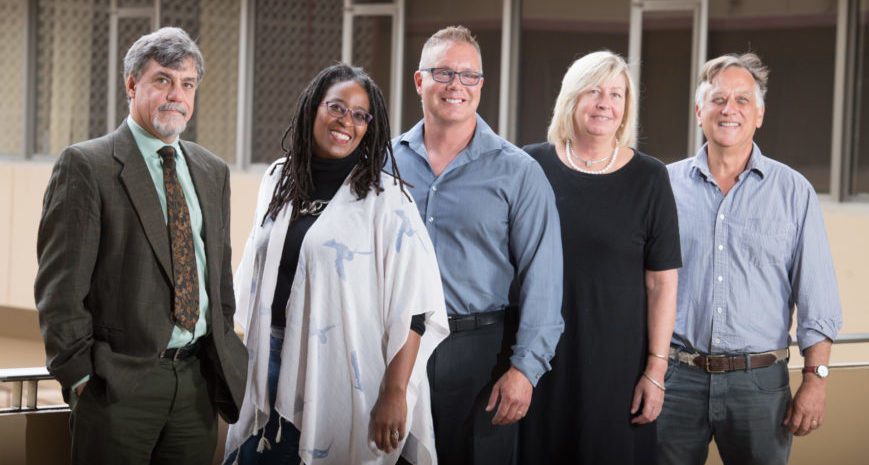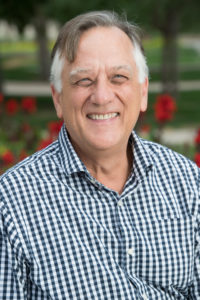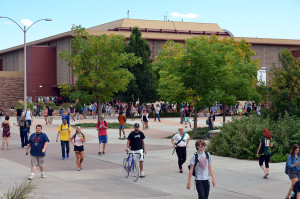
From left are Dean Ben Withers and College of Liberal Arts faculty members Camille Dungy of English, Associate Dean for Research Michael Carolan of sociology, Senior Associate Dean Alex Bernasek of economics and Edward Barbier of economics.
With his first year at CSU now under his belt, College of Liberal Arts Dean Ben Withers has announced plans to elevate the visibility and vitality of the college by increasing the support and impact of faculty scholarship. By building on existing strengths in the college, he sees opportunities to bolster leadership in three key interdisciplinary areas.
And hiring several new stellar faculty members is the first step.
Withers, who joined CSU in summer 2016 from the University of Kentucky, has been a staunch proponent of giving the liberal arts equal footing alongside science and technology when tackling the issues of the day.
“We absolutely must support scholarly excellence within our disciplines,” he says. “We also have to understand that to deal with today’s challenges, we must bring the knowledge our faculty have developed to address the human dimensions of critical social and cultural problems. These challenges cannot be confronted with technical know-how alone. They require specific disciplinary skills, as well as habits of eloquence, empathy, imagination and critical thinking, whose roots run deep in the traditions of the liberal arts. Those skills and approaches position the College of Liberal Arts well for the challenges that lie ahead.”

CSU’s institutional strengths, Withers says, reside in using interdisciplinary approaches to address its land-grant mission. Faculty from various fields commonly work together on projects in fields such as water, food systems, and the environment, and the dean plans to capitalize on these approaches.
“I’ve found CSU to be a remarkably collaborative place,” he says. “People can come together and develop great ideas; colleges and departments are willing to come together to accomplish amazing things.”

Three priority areas
In that spirit, Withers has worked with the chairs of the college’s departments to identify three priority areas that are hot topics nationally and cross multiple fields: environmental science/sustainability, race/diversity/inclusion, and internationalization/globalization. And he’s hiring more top-notch faculty in those areas, beginning with Edward Barbier, a renowned environmental economist who joins CSU this fall from the University of Wyoming.
Withers says the hiring of Barbier raises the profile of an already strong Department of Economics, where Professor Stephan Weiler created the Regional Economic Development Institute last spring.
“Bringing in someone like Ed takes us to the next level of that trajectory,” he says. “He’s one of the top 10 economists in his field nationally.”
Citing the Department of English’s hiring of prominent poet and professor Camille Dungy several years ago, Withers says bringing in strong faculty elevates the entire college’s profile — not just on campus, but nationally and internationally.
In addition to Barbier, the college has recruited several other terrific scholars in those three multidisciplinary areas who are starting this fall, including:
 • Ryan Scott of Political Science, who specializes in environmental policy with a concentration in managing emerging technology risks;
• Ryan Scott of Political Science, who specializes in environmental policy with a concentration in managing emerging technology risks;
• Tori Arthur of Journalism and Media Communication, a digital media specialist who focuses on immigration from Africa and other areas; and
• Jason Bernagozzi of Art and Art History, who co-developed an international experimental media art residency in New York called Signal Culture that has attracted more than 150 artists, researchers and developers from 26 states and 14 countries since 2014.
“We want to bring in people who can collaborate with departments across the college and the campus,” Withers says, noting that while Scott and Barbier are rostered in political science and economics, respectively, there is natural overlap with a department like philosophy, which is home to some of the world’s finest environmental ethicists. “The strategy is to build on areas where all units can participate — every department in the college is involved in at least one of those three topics.”
Faculty development
Faculty hiring won’t be centered exclusively on those three areas, Withers says, but they will be a priority in the three-year hiring plan for the college. He’s also focusing on faculty development: Finding new ways of supporting the college’s existing cadre of scholars has been a key goal for Associate Dean for Research Michael Carolan, a professor of sociology.
Great Conversations
The college’s Great Conversations series kicks off its 2017-18 series with “Civic Engagement & Governance in a Polarized Society” at 6:30 p.m. on Sept. 28 in the Iris & Michael Smith Alumni Center. The community discussion-in-the-round features former Colorado Gov. Bill Ritter, director of CSU’s Center for the New Energy Economy; CSU alumna Liz Spayd, former New York Times public editor; and other campus and community leaders. It will be moderated by Professor John Straayer of the Department of Political Science. The event is free and open to the public, but registration is required and can be completed online.
“We need to appreciate the contributions of people who have been here 10, 20, 30 years, and build on that strength,” Withers says.
Among those efforts, Carolan has held a faculty workshop on identifying external and internal funding for research, and the college is cultivating many partnerships with the One Health Initiative on campus. Withers points to the tremendous opportunity that the first-rate facilities in the University Center for the Arts present for collaboration in the performing arts, as well as the continued work of the transdisciplinary “Crisis and Creativity” initiative sponsored by the School of Global Environmental Sustainability.
Faculty from Sociology and Political Science have joined together to create the “Social Science and Research Data Center” to provide resources to faculty for data collection and analysis, Withers says, and Carolan is working with Becca Jablonski in the College of Agricultural Sciences on a “Food Systems Based Rural Wealth Creation” project. Both initiatives have won funding from the Office of the Vice President for Research as part of the Emerging Innovations Core Facilities and the Catalyst for Innovative Partnerships, respectively.
“These are concrete examples of how we’re making what faculty do here more visible and more vital,” Withers says.
Part of raising the stature of the liberal arts also involves creating opportunities for dialogue around current challenges and divisive issues facing society, as the college’s Great Conversations series does.
“Great Conversations brings together faculty, alumni, and community partners in a way that allows them to have productive discussions about faculty scholarship,” Withers says. “We need to have discussions across groups, based on fact and rational arguments, as opposed to the polarized environment we have now.”
He adds that he’s been impressed by CSU’s down-to-earth, “let’s get it done” mentality.
“I’ve not met anyone who’s breaking their arm patting themselves on the back,” Withers says. “Because of this practical mentality, we have a remarkable opportunity to define what a land-grant university of the 21st century is all about. One way is to recognize the importance and value of what we do in this college, whether it’s through the performing arts, breakthrough research or collaborating on common human challenges. The liberal arts can and must be a distinctive feature of how CSU defines its land-grant mission, a hallmark of how we see ourselves as a national leader and in service to the state.”